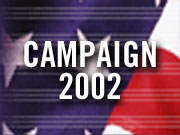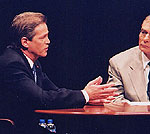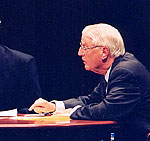Coleman, Mondale debate on eve of election
November 4, 2002
U.S Senate front-runners Republican Norm Coleman and Democrat Walter Mondale squared off Monday for their first and only debate. For one hour the two outlined competing positions on social, tax and international policy. The event took place at the Fitzgerald Theater in St. Paul, a day before voters decide who to send to Washington.
St. Paul, Minn. — The first and only Coleman-Mondale debate was civil, but unlike the campaign trail rhetoric which has come from the two camps since Mondale entered the race less than a week ago, the two Senate candidates freely criticized each other and pulled few punches.
| |
|
|
|
||
Throughout the forum, Mondale painted Coleman as someone beholden to special interests who've financed his multi-million dollar campaign. And Mondale repeatedly made the case that Coleman's agenda mirrors that of big business, wealthy Americans, right-wing Republicans and President Bush.
"You have a campaign here that's a poster child for what is wrong in politics," Mondale said. "You've taken -- not thousands -- but millions of dollars from special interests, from the Enrons, WorldCom. You have walked the line and I can be independent. I owe no one. I can go to Washington; so it's not just about the future, it's where that future's going to go. I represent people, I think your campaign has been entirely different."
Coleman portrayed Mondale as a politician from the past and a partisan Democrat unwilling to reach across party lines.
"I was a Republican mayor in a Democratic city and we figured out a way to get together," Coleman said. "We've got to change the tone in Washington. The Senate adjourned and there's no prescription drug benefit bill, there's no energy bill, there's no budget. And so we can't go back to the kind of partisan divides. I really believe if you look at the experience that I've had in the last eight years that is what I think all of Minnesota would want today. Figure out a way to get it together, bring people away and do it."
| |
|
|
|
||
Coleman lambasted Democrats for failing to compromise on legislation backed by congressional Republicans which would lower the cost of prescription drugs for senior citizens.
"It may not be a perfect bill, but the reality is seniors want it now. The Senate adjourned and seniors again are left with empty promises. That's the difference. The difference about standing there and advocating for all and seniors getting something and so I'm always focused on getting it done," Coleman said.
Mondale responded saying the prescription drug bill Coleman supports is the same bill the pharmaceutical industry backs. He says it represents the best interests of the drug manufacturers not average senior citizens.
"I understand the need for bipartisanship, but your bill lacks support in the Senate," Mondale said. "Fifty-one senators are for this superior bill and it's a good example of what divides us. My bill is good for seniors citizens. You said get it done. I don't think your bill should get done." The candidates also talked about abortion after a moderator asked about Mondale's stated position that he would not vote to confirm any judicial nominee who opposes legalized abortion.
Coleman said litmus tests are wrong. "I would apply the same standard to a nominee of a Democratic president as I would a Republican president. And I think that's what you've got to do. You rate folks, are they qualified, are they prepared to interpret the Constitution as it's written. My only test, and it's not a litmus test but the qualifier would be I would not be supporting folks going there saying they are judicial activists and are going to do what they say regardless of the Constitution."
Mondale accused Coleman of being disingenuous about his position on abortion, as well as other matters.
"What you're doing is sticking with the right wing and pretending to change the tone. It's not the fluff of what kind of words, and, Norm, we know you we've seen you; we've seen you shift around. We know about all of this and now you're in this location and you have to take responsibility for the position you're taking," Mondale said.
| |
|
|
|
||
"Again this is the tone that you don't want to see in Washington," Coleman replied. "This is the tone that's resulted in where we're at today. Where we don't have an energy bill, we don't even have a budget. We don't have a prescription drug bill. We don't have disaster assistance for northwest Minnesota because it's this tone."
Coleman and Mondale also scrapped over the issues of taxation and the struggling economy. Those two themes repeatedly resurfaced as candidates made their way through questions about rural development, affordable housing and education.
Mondale noted the economy nose-dived following the $1.3 trillion tax cut Bush steered through Congress in the spring of 2001.
Coleman, who supports the Bush tax cuts, said the economy was in trouble before Bush got elected. Coleman said tax cuts are the best way to restore economic growth. And in making his point, Coleman referenced Mondale's failed 1984 presidential campaign in which Mondale, who lost to Ronald Reagan, called for tax increases.
"Fundamentally you don't grow jobs, you don't grow the economy by raising taxes; the vice president thought that in 1984 he was wrong. He proposes now again what he calls rolling back some of the tax cut, that's raising taxes," Coleman said.
Mondale noted he supports tax cuts now, but not the Republican cuts Mondale says disproportionately benefit the wealthy. Mondale favors redirecting the Bush tax relief toward slashing payroll taxes, which he says would help average Americans.
Mondale defended his call for tax hikes during his presidential campaign. "You know, right after the election they raised taxes. I was the one who told the truth before the election. And I think that's one of the big things have to look at. Who's got the courage to stand up and level with the people even when it's difficult."
| |
|
|
|
||
When the issue of Iraq came up, Mondale said the Bush administration's approach has unnecessarily alienated other governments.
"We have to do what we haven't done a good job of doing, and that is reach out in the world and get our friends and out allies. It's in a situation today where people are getting elected by running against America and these are friends - they're not enemies. We have to get a better tone to our approach," he said.
Coleman defended the president, noting Congress overwhelmingly approved the use-of-force resolution Bush asked for.
"Had we taken the other approach, we would be negotiating from weakness. The world community would say the U.S. can't come together, Congress can't come together. What incentive do you think there would there be at that time, for folks to work with us? None. Mr. Vice President, again, I would respectfully say negotiating from weakness in these issues is not the way to get it done. It was not the way to get it done in Ronald Reagan's time. It's not the way to get it done," Coleman said.
Coleman said he disagrees with Bush's call for oil drilling in the Arctic National Wildlife Refuge and the president's opposition to trade with Cuba. Still, Coleman said he has a good relationship with the president which will help Minnesota, but not make Coleman a White House puppet.
Coleman says it will be the other way around - that Bush will, "owe me big time."
Mondale underscored his past Senate service, saying if he's elected he'll immediately become part of that Senate's leadership, which he says would help Minnesota.
The Independence Party and Green Party candidates were not invited to take part in the debate, despite their major party status. Jim Moore from the Independence Party unsuccessfully tried to block the debate through a court filing. He's now refusing to speak with Minnesota Public Radio and KARE-11 TV, which staged the debate.
Ray Tricomo from the Green Party, appearing on MPR after the debate, expressed outrage about his exclusion.
|
News Headlines
|
Related Subjects
|





